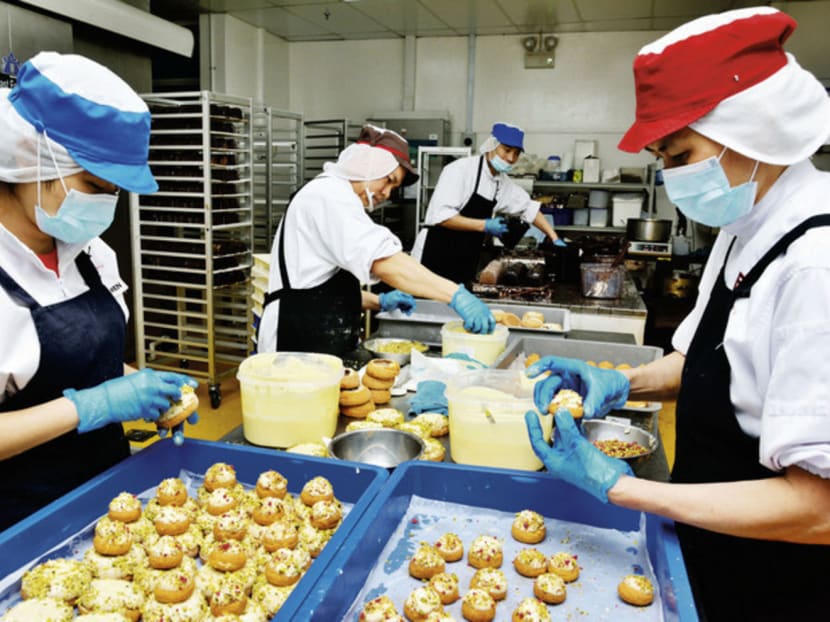Food handlers need to have a safety first mentality, say businesses
SINGAPORE — Food safety standards, management systems and certifications — these are all available to eateries and food service operators to help them minimise the risk of food contamination and food-borne illnesses. Yet, having these measures in place does not guarantee food safety.

Foodgnostic staff at work. Photo: Spring Singapore
SINGAPORE — Food safety standards, management systems and certifications — these are all available to eateries and food service operators to help them minimise the risk of food contamination and food-borne illnesses. Yet, having these measures in place does not guarantee food safety.
Case in point: The suspension of Goodwood Park Hotel’s bakery licence last month after 183 cases of food poisoning were linked to its popular durian puffs. This despite the fact that the hotel’s kitchen is certified to SS583: 2013, a Singapore standards Food Safety Management System (FSMS) for food service establishments.
Essentially, certifications such as SS583: 2013 provide a system for managing food and process risks to reduce food poisoning and cross contamination in commercial kitchens. So why do such cases still happen in certified kitchens?
“When food safety fails, I think many times it is due to human negligence,” said Pang Kok Keong, chef-owner of bakery chain Antoinette. Certainly, a company can train its personnel in food safety, but that doesn’t guarantee that the employees take those safety concerns seriously.
As such, the way to mitigate the risk of food contamination and poisoning is “to be very careful and never let your guard down”, added Daniel Tay, founder of food manufacturing company Foodgnostic Pte Ltd and online bakeries Cat & The Fiddle and Old Seng Choong Confectionery.
Tay’s central kitchen is certified to the 5S Environment System and the Hazard Analysis and Critical Control Point or HACCP (a management system in which food safety is addressed through the analysis and control of biological, chemical and physical hazards at every stage of the food production chain). Earlier this year, it also attained ISO 22000, a certification that addresses food safety management from farm to fork.
“Getting these certifications requires a lot of work and can be expensive, but in the event of any contamination incidences — say you find a foreign object in the food or the food causes food poisoning — you know where to look,” he said. “These things do happen in a food operation and sometimes it’s not the fault of your operation. With these systems, there is a chain of investigation that helps to trace the contamination and ensure it doesn’t happen again.”
Andrea Scarpa, group executive chef of the Da Paolo Group, agrees that certifications such as ISO 22000 and HACCP are critical systems to any major production facility. ISO 22000, for example, requires that every stage of the food production process is documented.
“From information about the growers you work with, to the temperature of the freezing system in the trucks that transport the food, to the sanitising of packaging, everything has to be documented,” said Scarpa.
“Without these safety systems, you are exposed to a vast array of complications. For example, pinpointing the source of an issue is close to impossible. With these systems in place, there are always counter measures you can take, protocols to follow, data to be measured and documented, even before a hand is lifted.”
In Goodwood Park Hotel’s case, investigations by the National Environment Agency (NEA), Ministry of Health (MOH) and the Agri-Food Veterinary Authority of Singapore (AVA) found that there were instances of poor personal and food handling hygiene practices during the preparation of durian pastries.
In one instance, they observed a food handler using gloves that did not cover her arms completely while preparing the durian crepe filling.
“This resulted in exposed skin on her forearms coming into contact with the durian filling when she was manually mixing it,” said the agencies in a statement.
Samples of durian pastries taken on April 13 tested positive for E coli and Salmonella bacteria, and two food handlers from the durian pastry kitchen tested positive for Norovirus, which causes diarrhoea and vomiting.
The suspension on Goodwood Park Hotel’s bakery kitchen was lifted on May 20, as it implemented and satisfied the safety measures stipulated by the NEA to rectify the lapses detected. Its deli will reopen in two days, selling only non-durian pastries for the time being.
When asked about the lessons learnt as a result of this incident, Goodwood Park Hotel said in an email that “while the hotel has always been strict about adhering to good food safety hygiene practices, this incident has been instrumental in reinforcing the need to keep to our FSMS standards in order to protect our guests’ well-being”.
“We have tightened our supervisory regime accordingly, and in particular, placed more emphasis on maintaining staff awareness of our FSMS policies and their understanding of how important this is in their jobs.”
No doubt, stringent processes notwithstanding, food safety ultimately boils down to the people handling the food.
Both Scarpa and Tay say that a “safety first” mentality is paramount.
“If the people don’t realise that food safety is your No 1 priority, then no matter what processes or policies you put in place, the risk of food contamination is still very high,” said Scarpa.





